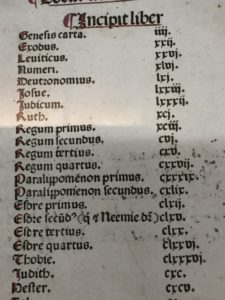
Culross Abbey, Scotland
The Apocrypha: Part 1
At first glance, through a Protestant lens, the Table of Contents in a Catholic Bible reveals titles not found in mainstream Protestant Bibles. Without an understanding of Biblical history, it is easy to judge this “unfamiliar” at best and “heretical” at worst. Collectively, these Old Testament books are known as the Apocrypha. This post will explain the contents of the Apocrypha and the next post will explore the context within the historical timeline of the Bible.
Apocrypha comes from the Greek word meaning “hidden” or “obscure.” Depending on the source, there are 12 to 15 original apocryphal books. Written decades before Jesus’ birth, they were included in the Septuagint (ancient Greek translation of Jewish Scripture). The Septuagint was the most popular Bible translation during the time of Jesus because of extensive Greek (Hellenistic) influence. Since many people didn’t speak or read Hebrew, this was the translation they could turn to. Jesus may or may not have studied/read from the Septuagint because the synagogues likely rejected use of the common Greek language in their sacred teaching (especially at the Temple). Either way, Jesus most certainly would have been familiar with the writings contained in these “hidden books.” Furthermore, it is logical to assume any of Jesus’ Disciples, Apostles, and followers who spoke/read Greek would have been very familiar with the Septuagint.
After the destruction of the Temple (70AD), the Hebrew canon (official collection of literary works) was reorganized and omitted the apocryphal books. The Septuagint retained them, as did many translations up to and including the Gutenberg Bible (1454) and King James Version (1611). Surprising to some, Martin Luther’s German Bible also included the Apocrypha but separated it into a separate, second canon (deuterocanonical books). Even the Geneva Bible (1560), brought to the New World by the Pilgrims, included the Apocrypha. As the Protestant Reformation grew, most (but not all) non-Catholic denominations eventually dropped the Apocrypha to reflect the revised Hebrew Canon (Tanakh).
To say the Apocrypha is “only Catholic” is misleading. Early Greek and Gentile Christians (and perhaps even the Apostles) used the Septuagint. Even back then, those books (along with debate over some parts of the New Testament Canon) were viewed as important Biblical literature though perhaps not divinely inspired for teaching. Understanding the Apocrypha increases understanding of the world Jesus walked and the history of the written Word of God. It also embraces the reality those books would have influenced the teaching and growth of the Early Church.
Today, most Catholic Bibles include seven Apocryphal books which are located among the other books of the Old Testament canon (instead of being grouped together in a separate section). A brief introduction to these books follows:
TOBIT
Author: Unknown
Date written: 225-100BC
Historical account of the Jews’ deportation to Nineveh in 721BC. Follows the individual stories of Tobit and Sarah (who are both suffering) and how God cares for them. Considered “Wisdom Literature.”
JUDITH
Author: Unknown
Date written: 500BC-70AD
Summary: Fictional story/Parable detailing a Jewish widow’s leadership against the invading Assyrian army. Contains historical errors but is a story of faith.
1 MACCABEES
Author: Unknown Jewish Author
Date written: around 125BC
Summary: Story of Jewish revolt led by the Maccabees; origins of Hanukkah
2 MACCABEES
Author: Possibly Jason of Cyrene
Date written: 150-100BC
Summary: Overview of Jewish resistance to Greek occupation; origins of Hanukkah
WISDOM OF SOLOMON
Author: One or multiple authors
Date written: around 50BC
Summary: Follow-up to Solomon’s writings encouraging Jews living in Egypt not to abandon their faith and traditions.
SIRACH
Author: Greek translation from Hebrew credited to Jewish Scribe Ben Sira
Date written: 200-175BC
Summary: Wisdom of following Judaism over Hellenism
BARUCH
Author: Perhaps Jeremiah’s secretary Baruch
Date Written: 200-100BC
Summary: Compilation of writings offering wisdom and encouragement as the conquered Israelites await deliverance from Babylonian exile.
